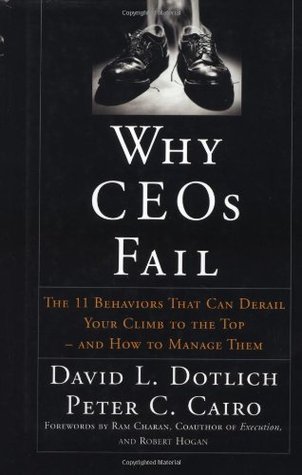Why CEOs Fail Summary
5 min read ⌚
 The 11 Behaviors That Can Derail Your Climb to the Top–And How to Manage Them
The 11 Behaviors That Can Derail Your Climb to the Top–And How to Manage Them
Many of us wonder, what it’s like being a CEO?
How did those people get there? What do they have that you don’t?
Well, this book doesn’t give answers to those questions, but it does expand on what can cause a downfall.
Let’s find out!
Who Should Read “Why CEOs Fail”? And Why?
In all honesty, being a CEO is hard work, and many people on the other side of the fence, don’t seem to get that.
If you have the passion to run your own company and get a good look at the hurdles that will come your way, you should definetely give this book a quick read.
In other words, “Why CEOs Fail” will open your eyes, and give you the tools needed to win the corporate fight.
About David L. Dotlich and Peter C. Cairo
 David L. Dotlich is a partner in CDR International, a former executive vice president, and the co-author of Action Coaching and Unnatural Leadership: Going Against Intuition and Experience to Develop Ten New Leadership Instincts.
David L. Dotlich is a partner in CDR International, a former executive vice president, and the co-author of Action Coaching and Unnatural Leadership: Going Against Intuition and Experience to Develop Ten New Leadership Instincts.

Peter C. Cairo teaches at the Columbia University Business School. He is hailed as an expert in leadership and works as a consultant – helping many companies to transform their operations.
Amongst other things, Peter is also a partner in CDR International.
“Why CEOs Fail Summary”
Are you a successful CEO with a fast-growing company? Do you have everything you have ever wanted in your life, and think nothing and no one can take this away from you?
Well, what if we told you that there are precisely eleven characteristics you might have, which can accelerate your downfall and burn your business?
Interested? Let’s lay them out in the open:
Arrogance
We all know that if you want to be successful, you need to build that self-self-esteem and thrive under pressure.
However, Jeffrey K. Skilling, Enron’s CEO, using his own example, teaches us how everything can change in a flash if, at some point, that self-confidence and dignity turn into arrogance.
Melodrama
Marketing is all about selling the story, not the actual product.
Burst that bubble of insecurity and let your ideas represent the company’s vision because actions speak louder than words.
Volatility
Aside from the fact that mood swings can cause some temporary setbacks, they are not that much big of a deal.
The real issue emerges due to a lack of control.
That is because they often harden the communication with your employees, and the work itself, which usually results in collapse.
Excessive Caution
Nowadays, it is challenging to soar up through the company, and you, as a CEO, need to be very cautious. Nevertheless, if you are constantly worrying about what might happen, your progress will be slower, as well as your productivity.
Habitual Distrust
President Richard Nixon is the perfect example of a person with a habitual distrust. These people, who never think positively about anything, are the ones that cannot make any progress because they are so focused on the negative that they often forget to move forward.
Aloofness
Although you need a proper distance from your employees, you also need a certain connection with them to function as a team. If you are too distant, it can be precarious. So, if you are easily approachable, they won’t have a problem to contact you for whatever happens.
Mischievousness
If you consider yourself someone who can break the rules and act upon this belief, you could ruin your career at some point. Don’t forget that even President Bill Clinton thought he could do whatever he wanted, and look what emerged as a result of arrogance.
Eccentricity
Actually, it is great if you differ from the others, we need that kind of mentality these days.
It means that you are a self-sufficient, individual whose ideas give birth to a new concept. However, remind yourself that inflexibility can ultimately produce a negative outcome.
Passive Resistance
If you want to succeed in business, you must have an open mindset and be willing to speak your mind.
Sometimes, your perspective will not be in line with the general outlook on the mattering question, but it doesn’t make any difference.
Perfectionism
Being a perfectionist can motivate you to become a better version of yourself with regards to business and personal life.
Still, it may derail you since you’ll never be fully satisfied.
Eagerness to Please
It is possible to lose track of the key elements leading to success, especially when it is required of you to keep your wits regardless the circumstances.
As a CEO, you must establish clear boundaries with your workers in order to make things work.
Key Lessons from “Why CEOs Fail”
1. Everyone fails
2. You can be one of your biggest enemies
3. Balance is the key to everything you do
Everyone fails
Nowadays, we often find our motivation in other people’s lives, and that is okay. Nevertheless, being too impatient and desperate for getting success within reach, often creates more pressure than it should.
This book is a reminder that even the most successful people have been through some quite challenging things, and they, too, have failed many times, but their dedication and their work are the things that have made them successful.
You can be one of your biggest enemies
For those who are already at the top, this book is a great reminder that it is tough to maintain an international stature. However, you’ve got the potential to beat the odds! If you learn, on time, how to recognize, accept and change your flaws, you will come out victorious.
Balance is the key to everything you do
As a head of a company, you have a huge responsibility towards your business and your employees. So, to make things work for everyone, you need to find the balance in everything you do, and everything you give. If you don’t commit enough, a failure will become a possible outcome. Beware of any external influences, and give it all you got!!
Like this summary? We’d Like to invite you to download our free 12 min app, for more amazing summaries and audiobooks.
“Why CEOs Fail” Quotes
When a CEO and executive committee become aware of the traits that can trip them up and learn to discuss them openly, the entire company will benefit. Share on X One of the toughest balancing acts in the leadership business is between confidence and too much confidence. Share on X Today, CEOs who are overly cautious frequently fail. There’s just too much data to analyze. Share on X The leader who is consistently distrustful sends a message that people had better watch their backs rather than work. Share on X The irony of being a pleaser is that you ultimately don’t end up pleasing the majority of people. Share on XOur Critical Review
Even though “Why CEOs Fail” delves a bit deeper into the most common flaws of the CEOs and what leads to their downfalls, and gives us more detailed information about it, it is short of real-life examples. David L. Dotlich and Peter C. Cairo should have included a lot more of those in this piece of work.
Emir is the Head of Marketing at 12min. In his spare time, he loves to meditate and play soccer.


 The 11 Behaviors That Can Derail Your Climb to the Top–And How to Manage Them
The 11 Behaviors That Can Derail Your Climb to the Top–And How to Manage Them




